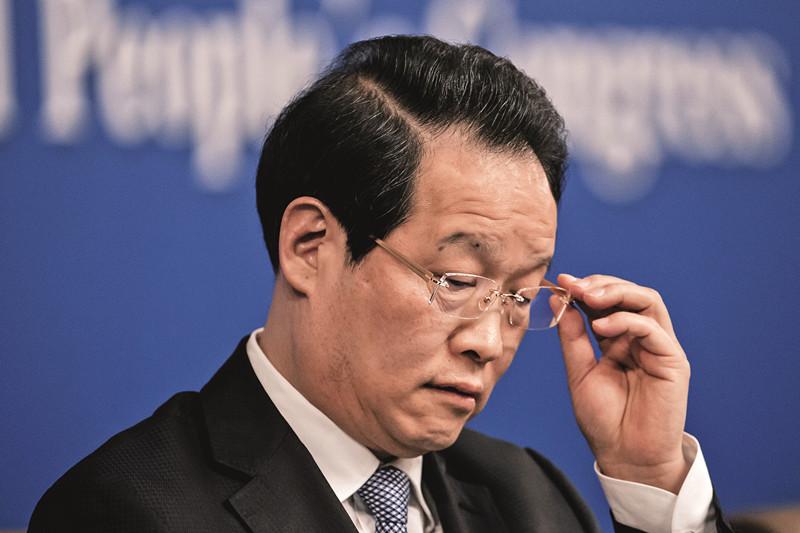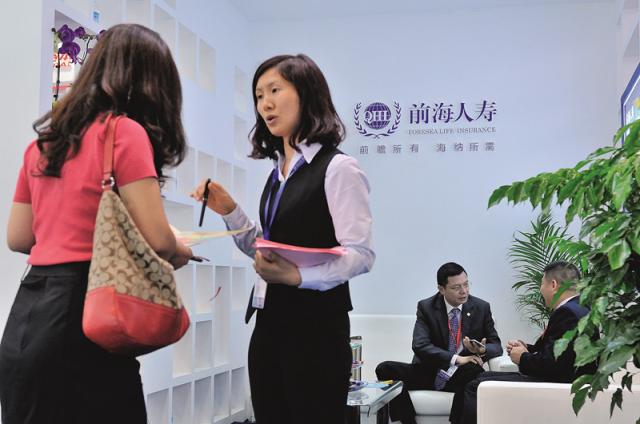
 Old Version
Old Version
Financial Corruption
On May 5, 2017, the State Council, China’s cabinet, announced the removal of Xiang Junbo from the post of the chairman of China Insurance Regulatory Commission. Xiang is being investigated for alleged “serious violations of the Party’s code of conduct,” a euphemism for corruption, according to an early announcement made by the top anti-graft authority on April 9.
At the same time when the announcement was made on April 9, China’s official government website released the full text of Premier Li Keqiang’s speech delivered during the clean governance conference held on March 21 in which he vowed to strictly crack down on financial corruption. The pledge came as the world’s second largest economy continues to deepen reforms in pursuit of steady economic growth.
Li pointed out that it is crucial to prevent financial risks and corruption and crack down on violations by banks, such as fraudulent loans, insider trading in the securities market and insurance fraud. He added that the authorities will relentlessly punish internal supervisors and company managers who collude with big players in the market to steal and sell secret information.
“Financial supervisors who violate the law must be punished to serve as a warning to others and maintain the proper order in the financial sector,” Li said in his speech. Financial insiders and anti-graft experts noted that this was a strong signal that the country has started a new round of anti-graft campaigns in the notoriously corrupt financial sector.
“The crackdown on financial corruption is now heading into deep water,” Li Yongzhong, former deputy head of the Chinese Discipline Inspection Institute, told NewsChina. He said that the country’s anti-graft drive needs to pay close attention to State-owned enterprises rather than just government bodies.
Since the start of the year, a spate of financial corruption cases have been reported including four major cases in April alone. On April 9 when it was announced that Xiang Junbo was under investigation, the Central Commission for Discipline Inspection of the Communist Party of China (CCDI), the top anti-graft authority, also announced the investigation of Li Changjun, former Party chief and president of the Beijing Branch of the Export-Import Bank of China, for suspected serious violations of the Party’s code of conduct. Four days later, Zhao Pinzhang, former deputy governor of China Minsheng Bank was put under official investigation alongside a sub-branch head.
Corrupt activities and legal violations in the financial sector have become common, at a time when the sector is rife with monetary risks, including bad assets, bond defaults, shadow banking and illegal Internet financing. Statistics from the Supreme People’s Procuratorate showed that from January 2014 to June 2015, 877 people in the sector were investigated for bribery or abuse of power.
Those under investigation include both “high-ranking officials” of regulatory organs and “senior executives” of financial institutions. From May 2013 to May 2017, the names of at least 34 people involved in financial corruption were disclosed on the CCDI website, including 11 regulators, 10 people from banks, four from insurance institutions and seven from investment agencies. In another survey conducted by the Legal Daily’s Faren magazine, one third of 602 crimes committed by entrepreneurs in 2016 were related to investment and financing.
In the opinion of Yu Guodan, a professor at the anti-graft and clean governance center of the China University of Political Science and Law, financial corruption has drawn in a huge number of people, and there are plenty of crimes that are yet to surface. He argued that besides the common crimes of bribe-taking, embezzlement and bribery, economic crimes like insider trading have been on the increase at a time when corruption in the financial sector usually involves large amounts of money, produces severe consequences and causes heavy economic losses.
Compared with other areas, he added, corruption in the financial sector is more technical, and thus harder to uproot.
“Financial crimes are serious and shocking. It may affect economic stability and national security if proper measures are not taken,” he told NewsChina.
Li Yongzhong told our reporter that regulatory authorities and banks have become high-risk areas of financial corruption. He blamed corruption for the concentration of power and the unsystematic staff selection process and promotion systems. “Our financial model lags way behind the market,” he told our reporter.
According to Li, in both the big five State-owned banks, the People’s Bank of China or the regulatory agencies, senior officials are appointed in the same way as government organs. Few leaders in the financial sector have a professional background in the field, which has become a shackle around the ankles of financial reform.
“There are three main types of corruption: nepotism, insider trading and extortion. They are all also prominent in the financial sector,” Qiao Liang, a researcher at the National Academy of Development and Strategy, Renmin University of China, told NewsChina.
Qiao said that to most people the finance sector might seem full of market regulations and strict trading rules, but it controls a huge amount of resources. Financial corruption “mainly stems from the monopoly of the distribution of power and resources” and it is easy to fall into corruption when tempted by rich profits.

The business of some insurance companies is under strengthened scrutiny
The fight against financial corruption is not a recent campaign. As early as March 2014, the CCDI initiated a round of institutional restructuring and the number of disciplinary inspection teams was increased to 12, including one directly responsible for financial institutions. After the CCDI inspector conference on February 11, 2015, its supervision was expanded to cover all financial enterprises which are directly controlled by the central government.
But despite the tightening anti-graft campaign and the introduction of harsh measures to curb corruption, corruption in the financial sector, however, continued to abound. In the opinion of Li Yongzhong, the key to curbing financial corruption lies in discovering the fundamental loopholes that allow the problem. But, he says, political reform has to accompany financial reform. “To begin with, we need initial research to grasp basic information, including how serious the financial corruption is, the proportion of corrupt staff, and how to deal with the situation when a large number of staff and a great amount of money are involved,” Li said. “Without a pilot program, we’re fighting in the dark.”
Li told our reporter that currently a pilot program of supervisory reform is under way in Beijing, as well as Shanxi and Zhejiang provinces, but it will take time to expand it across the entire financial sector. Because of backward financial models, financial reform continues to stand still, which obstructs anti-graft efforts.
Financial institutions have their own supervisory organs that have played a crucial role in curbing corruption. Li said that the disciplinary supervision organs and financial regulators are playing different roles. The former are dedicated to laying out strategies to curb corruption and the latter are responsible for specific anti-graft campaigns that discover the roots of corruption in banks, securities organizations and the insurance system before remedying the issues.
Qiao Liang added that disciplinary inspection and supervision organs can intervene only after corruption is committed, then conduct investigation following tip-offs. Financial regulatory agencies, however, can get involved when there is a sign of unusual trading through internal supervision and therefore prevent corruption before it takes off.
“Criminal penalties could root out illegal practices but not eliminate the breeding ground of crime. What’s more, the effect of criminal penalties will wane as time goes by. The focus should be on the institutional improvement,” Yu Guodan said. “It does not mean that criminal penalties are unimportant.”
Yu recommended two steps to curb financial corruption. The first step is to increase deterrence through harsh and prompt criminal penalties on corruption. The next step is to build a sound institutional system which will take longer and require more overall planning but is fundamentally needed to stop the problems. Li Yongzhong said, however, that a combination of measures are needed. One of them is to end cash payments, because checks and bankcards are easier to trace. More talent also needs to be drawn to corporate governance to effectively supervise the finance sector’s power.
“It is impossible to eradicate corruption entirely but institutional improvement and the establishment of the long-term mechanism will diminish the corruption risks to the minimum to better serve the real economy,” Li said. “It will be a great success if anti-graft efforts in the finance sector can contribute to the financial reform.”